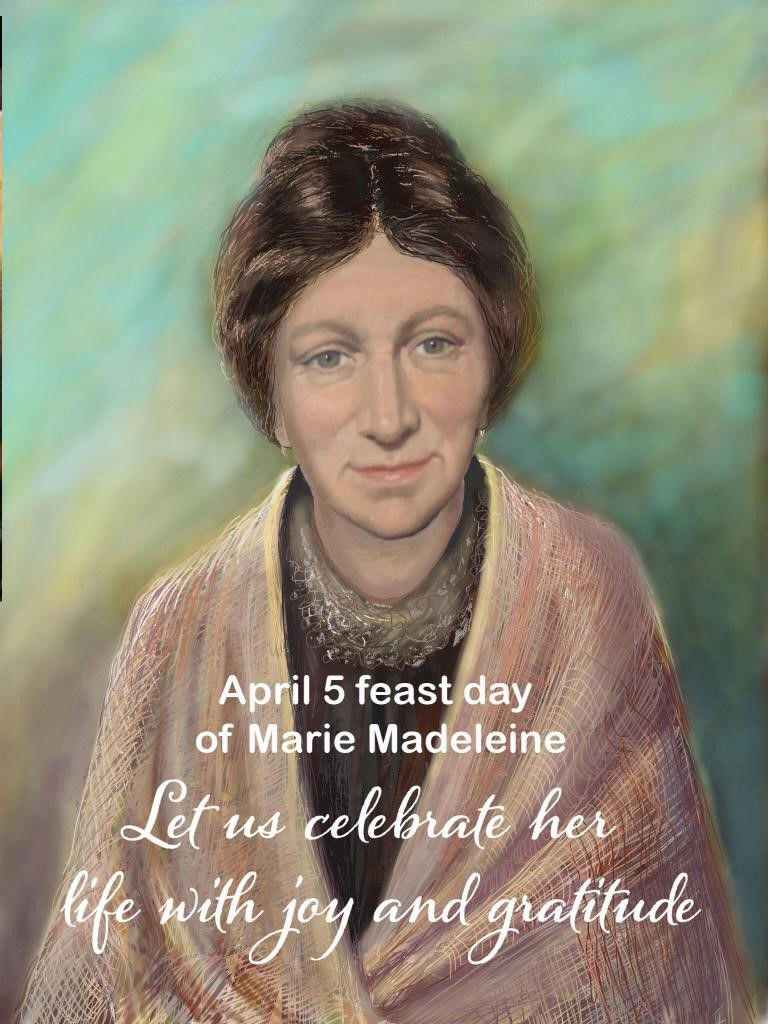Marie Madeleine d'Houët Feast Day
- admin24312
- Apr 4, 2022
- 4 min read

A letter from Sr Claire Sykes, Vice Postulator for the Cause of Marie Madeleine d’Houët,
on the occasion of Marie Madeleine’s Feast Day, April 5th, 2022
Dear Sisters and Companions in Mission,
Once again, it is Marie Madeleine’s Feast Day, with its opportunity to express gratitude for the life of this saintly woman. Further, the celebration of her response to God’s call gives us an opening – if we need it, to pray for the suffering people of Ukraine and Myanmar.
Marie Madeleine was no stranger to the atrocities of revolution and war and there is an episode in her life that is worth deeper reflection. We are familiar with the story, but I invite us to look at it with fresh eyes, savouring the detail as an Ignatian prayer.
In ‘God’s Faithful Instrument’, Patricia Grogan fcJ, writes that ‘In January 1809 the inhabitants of Bourges watched, aghast, the long convoys of Spanish prisoners arriving from the frontier and filling the hospitals of the town. For the last ten years Napoleon had been marching from one victory to another, upsetting dynasties, changing the map of Europe, and placing his relatives on vacant thrones. In this last campaign England, Austria and Prussia had experienced defeat. French armies had penetrated Italy, Dalmatia, Poland, Denmark, and Portugal.
At home in France the population had long since become weary of war. Few were the families that had been spared the death or wounding of a father, son or brother. With the occupation of the Papal States, the Pope arrested and carried off into captivity, the Church was facing yet another period of persecution. The war in Spain was reported to be more tragic than elsewhere. It was there the picked French troops met their first set-back, repulsed by a population heroic to the degree of fanaticism. While the youth of France were being drafted in thousands to the frontier, convoys of prisoners who had escaped death, limped to the camps and hospitals of central France. With horror and fear the citizens of Bourges saw them come. Exhausted, wounded, even mutilated, many were ill with typhus. Bound together behind army carts, they were dragged rather than led. The local population for the most part could only see in them the implacable enemy that had inflicted atrocities on the French troops.
At a loss as to whom to appoint to care for the unfortunate prisoners, the Imperial Army appealed to the Daughters of Charity of St. Vincent de Paul. The Revolution had sadly diminished their ranks. Most of the available sisters were already serving in camps and hospitals nearer the frontier. The few who remained in Bourges needed assistance.
Marie Madeleine Victoire’s decision was soon made. Under the pretext of absenting herself on business, she slipped away. In the guise of a peasant woman and assuming a false name, she offered herself as an assistant at one of the hospitals. Accepted as an unknown woman, undoubtedly a generous one but lacking professional expertise, the tasks assigned to her were the lowliest. Victoire responded simply, giving of her best, struggling against sheer physical fatigue and the thought of Eugene, who, to her feverish mind, seemed to be calling her away. On the ninth day she succumbed to fever and exhaustion and asked to be taken to Parassy. Once there, Victoire sent for her sister, Angèle.’ (Pages 30 and 31)
Victoire was at death’s door with cholera, and we know that before falling unconscious she confided her son to Angèle, indicated where there was money for the poor, and made a general confession. A Sister of Charity - who had worked with Victoire in the hospital, died of the cholera. For Victoire’s family, there were long weeks of suspense, with nights of deep anxiety and on the fifteenth day hope gave way to relief when the patient regained consciousness and began to recover.
Reflecting on this episode, one might ask was it a responsible decision for the mother of a four-year-old child to even offer to serve in such a dangerous situation? … Was it an impetuous decision?
We can’t answer these questions and can only note that several people, including her sister, admired Victoire’s incredible courage and that her choice triggered nothing but good in her family. Family friends noted the change in the tenor of life in the de Bengy household. In fact, her gesture in favour of the stricken Spanish soldiers – who were prisoners of war, sharpened the family’s social conscience and marked a turning point in Victoire’s life.
So, dear FCJ Sisters and Companions in Mission, as we see the victims of war, whether refugees or soldiers, let us ask Marie Madeleine to pray with us for the grace to discern well, and for the courage to make choices that will widen the ‘Circle of Love’ - even when it involves risk. We beg her too, to pray with us for a conversion of heart for all world leaders.
May we celebrate the life of our Foundress, Marie Madeleine, with joy and deep gratitude.
With all blessings and in companionship,
Claire Sykes fcJ
Vice-Postulator for the Cause of Marie Madeleine


Comments